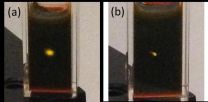(Press-News.org) Babies born very premature or severely underweight are at heightened risk of becoming introverted, neurotic, and risk averse as adults, indicates research published online in the Archives of Disease in Childhood (Fetal & Neonatal Edition).
This personality profile may help to explain the higher rates of career and relationship difficulties experienced by this group as adults, suggest the researchers.
Very premature birth at less than 32 weeks and/or very low birthweight of less than 1500 g are known to be linked to a heightened risk of autistic spectrum behaviours, but it has not been clear if prematurity and low birthweight might affect other adult personality traits.
The researchers therefore compared the personality traits of 200 26 year olds who had been born very prematurely and/or severely underweight with those of 197 young people who had been born at term and within the normal weight range.
They wanted to find out if there was a distinct personality profile linked to extreme prematurity/low birthweight, and if lower IQ--which is associated with very early birth-- explained any personality differences.
Study participants were either part of the Bavarian Longitudinal Study, which has been tracking the health and wellbeing of children born in 1985-6 in Southern Bavaria, Germany, and admitted to hospital within 10 days of birth, or those born at term in the same maternity units over the same timeframe.
Personality traits were assessed at the age of 26 across five dimensions: introversion; neuroticism (tenseness and anxiety); levels of openness to new experiences; agreeableness; and conscientiousness.
Adults who had been born very prematurely and/or extremely underweight scored significantly higher on all but two of the personality traits--conscientiousness and openness--than their peers born at term.
Taking account of potentially influential risk factors did not alter the magnitude of these differences.
Adults who had been born very prematurely and/or extremely underweight also reported significantly higher levels of autistic spectrum behaviours, introversion, neuroticism, agreeableness and lower levels of risk taking.
The personality traits that best described the profile of adults who had been born very prematurely and/or extremely underweight were: introversion, risk aversion, autistic spectrum behaviours and neuroticism. The findings held true even after taking lower intelligence into account.
This cluster of traits describes a 'socially withdrawn personality,' or someone who is easily worried, less socially engaged, less interested in risk taking, and less communicative, say the researchers.
"The higher scores of [very premature/low birthweight] adults on the socially withdrawn scale are most likely to be the result of alterations in their brain structure and functioning due to the amalgam of changes in brain development related to premature birth and prenatal and neonatal insult," write the researchers.
They go on to suggest that these children are likely to be exposed to considerable stressors in neonatal intensive care, which may affect brain development and adult adaptation, added to which early birth may prompt parents to be over protective.
The physiological circumstances of these babies' birth might help explain the higher rates of career and relationship difficulties in adulthood, say the researchers.
The evidence shows that many adults born very premature/low birthweight are less likely to go on to higher education or get well paid jobs; and they find it harder to make friends, find long term partners, and become a parent, the researchers point out.
INFORMATION:
Depression and personality disorders are the most common diagnoses among Belgian psychiatric patients requesting help to die, on the grounds of unbearable suffering, finds research published in the online journal BMJ Open.
Drugs, given either by mouth or administered intravenously, are used to perform euthanasia in Belgium, where the practice has been legal since 2002.
The researchers wanted to find out if there were any discernible patterns in requests for euthanasia among mentally ill patients in Belgium in a bid to inform recommendations for future research.
So ...
1. Placebo delivery method affects patient response to "therapy"
Free abstract: http://www.annals.org/article.aspx?doi=10.7326/M15-0623
URLs go live when embargo lifts
A systematic evidence review published in Annals of Internal Medicine finds that the way in which a placebo is delivered makes a difference in how patients respond to "therapy." Having a clinically significant response to the sham treatment could substantially affect outcomes in placebo-controlled trials. The data suggests that some placebos have a stronger effect than others.
Placebo controls, ...
The University of Colorado Cancer Center and Loxo Oncology, Inc. (Nasdaq:LOXO), a biopharmaceutical company focused on the discovery, development and commercialization of targeted cancer therapies, today announced the publication of a research brief in the online edition of the journal Cancer Discovery, describing the first patient with a tropomyosin receptor kinase (TRK) fusion cancer enrolled in the Phase 1 dose escalation trial of LOXO-101, the only selective TRK inhibitor in clinical development. Additional contributors to the paper include the Knight Cancer Institute ...
RIVERSIDE, Calif. -- When it comes to installing solar cells, labor cost and the cost of the land to house them constitute the bulk of the expense. The solar cells -- made often of silicon or cadmium telluride -- rarely cost more than 20 percent of the total cost. Solar energy could be made cheaper if less land had to be purchased to accommodate solar panels, best achieved if each solar cell could be coaxed to generate more power.
A huge gain in this direction has now been made by a team of chemists at the University of California, Riverside that has found an ingenious ...
A Johns Hopkins-led study of outcomes among 1,200 people with implanted defibrillators -- devices intended to prevent sudden cardiac death from abnormal heart rhythms -- shows that within a few years of implantation, one in four experienced improvements in heart function substantial enough to put them over the clinical threshold that qualified them to get a defibrillator in the first place.
A report on the study, published in the Aug. 4 issue of the Journal of the American College of Cardiology, reveals these patients had markedly lower risk of dying and were far less ...
In a project spearheaded by investigators at UC San Francisco, scientists have devised a new strategy to precisely modify human T cells using the genome-editing system known as CRISPR/Cas9. Because these immune-system cells play important roles in a wide range of diseases, from diabetes to AIDS to cancer, the achievement provides a versatile new tool for research on T cell function, as well as a path toward CRISPR/Cas9-based therapies for many serious health problems.
Using their novel approach, the scientists were able to disable a protein on the T-cell surface called ...
Use of gene therapy to deliver a protein that suppresses the development of female reproductive organs may improve the survival of patients with ovarian cancer that has recurred after chemotherapy, which happens 70 percent of the time and is invariably fatal. In their report receiving online publication in PNAS Early Edition, a Massachusetts General Hospital (MGH) research team describes how a single injection of a modified version of Mullerian Inhibiting Substance, a protein critical to sexual development, carried on a commonly used viral vector suppressed the growth ...
As many as 20 percent of people may have a benign cyst or tumor in their pituitary gland. The vast majority of pituitary tumors are noncancerous, but can cause headaches and profound fatigue, and can also disrupt hormone function. Currently, surgeons rely on radiologic images and MRIs to gather information about the size and shape of the tumor, but the resolution of such imaging technologies is limited, and additional surgeries to remove more of the tumor may be needed if a patient's symptoms persist. In a new study published in the Proceedings of the National Academy ...
Estimates of how much nitrous oxide, a significant greenhouse gas and stratospheric ozone-depleting substance, is being emitted in the central United States have been too low by as much as 40 percent, a new study led by University of Minnesota scientists shows.
The study, published today in the journal Proceedings of the National Academy of Sciences, measured how much nitrous oxide is emitted from streams in an agriculturally dense area in southern Minnesota. Agriculture, and specifically nitrogen fertilizers used in row-crop farming, is a major contributor to nitrous ...
SAN FRANCISCO, CALIF. - July 27, 2015 - Two new studies presented today at the Society of NeuroInterventional Surgery 12th Annual Meeting in San Francisco, report that Mobile Stroke Treatment Units (MSTUs) can significantly reduce the time it takes to diagnose and treat patients for stroke, greatly improving survival rates and enhancing a patient's chance of recovery.
There are currently four MSTUs in use worldwide. Two are in Germany and two are in the United States (U.S.) - one in Cleveland and one in Houston. MSTUs resemble ambulances on the outside, but contain ...

